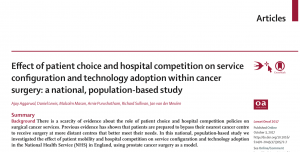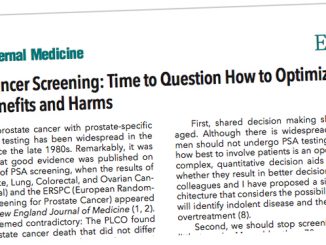 Does robotic surgery offer superior outcomes? Yes and no – or better: yes and maybe – answers a study published earlier this month in The Lancet Oncology: their clinical benefit is still uncertain, but robots appear to offer superior outcomes in terms of marketing, attracting patients and helping surgical centers stay open.
Does robotic surgery offer superior outcomes? Yes and no – or better: yes and maybe – answers a study published earlier this month in The Lancet Oncology: their clinical benefit is still uncertain, but robots appear to offer superior outcomes in terms of marketing, attracting patients and helping surgical centers stay open.
«Several countries have introduced policies that allow patients to choose a specific health-care provider, with the aim of improving the quality of care. We did a systematic review to assess the evidence that patients with cancer are willing to travel beyond (bypass) their nearest hospital for cancer surgery, and to assess the effect of competition on outcomes of surgery» write Ajay Aggarwal and colleagues from the London School of Hygiene & Tropical Medicine.
Between 2010 and 2017, in the UK, the number of robotic centres has more than tripled, despite a lack of evidence of improved outcomes in terms of survival and side effects compared to open surgery. In the same period, 16 prostate cancer surgical centres were closed: none of the 16 NHS centres that closed had invested in robotic equipment. Nor had any of the centres that closed done so because of explicit evidence of poorer quality.
«Even within publicly-funded systems like the NHS, competition policies have stimulated a form of centralisation through “natural selection”, as centres invest in unproven new technologies to protect their status, instead of services being regionally planned and coordinated. Similar patterns have been observed in other health-care markets such as the United States» concludes Aggarwal. «Rapid adoption of high technology therapies is not unique to prostate cancer, and further research should look at other types of cancer where new types of treatment are increasingly available as well».
«Parallels can be drawn with another case where the latest technology seemed to drive policy and investment» writes Kalipso Chalkidou, from the Imperial College London, in the accompanying comment. «The Cancer Drugs Fund (CDF) in England favours the latest cancer drugs, specifically those shown not to be good value for money by NICE, at the expense of drugs for other diseases or indeed non-drug cancer interventions such as radiotherapy or surgery, as concluded recently by the same authors. Despite a recent revamp, CDF remains a missed opportunity for generation of data on comparative effectiveness to inform patient and professional choice».





